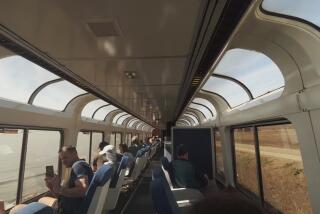‘Orphan Train’ Reunions Stir Bittersweet Memories
- Share via
TULSA, Okla. — All that Alice Marion Ham knows of her origins is that police found her and her toddler brother, Robert, on a New York City street in 1926.
They became part of the Orphan Train movement, bundled by orphanage workers onto a train that carried them from the city to a new life.
She wound up moving from one abusive home to another, while Robert was taken in by a family that treated him like royalty.
“They were doing the best they knew how to do,” said Ham, now 76. “What else were they going to do with a bunch of kids? You can’t throw them back out on the streets. At least we had a roof over our heads.”
She and seven other riders of the Orphan Trains got together recently, along with descendants of other riders, to share memories of being orphaned or abandoned in New York and getting sent off to new families in the West and Midwest.
They said the reunion helped them build a sense of identity and common heritage.
“These people in here, I’m related to them, I feel like,” said Ham, of Sand Springs, Okla.
The Orphan Train movement ran from 1854 until 1929, relocating about 150,000 children from New York at a time when poverty and that city’s booming immigrant population resulted in overcrowding, disease and death.
The aim of the so-called Orphan Trains was to take orphans to wholesome farming families who could offer loving homes, although that did not always happen.
Some of the children were greeted at train stations by families who had been previously contacted by foundling home nuns and nurses. Others were paired with families by lottery, and some were lined up at stations so prospective parents could inspect them before making a choice.
Siblings often were split up.
“There was so much hurt and pain of being separated from your family,” said 77-year-old Alice Bullis Ayler of Oklahoma City. “The main thing they told us was not to talk about it. There was such a stigma on orphans.”
Ayler remembers riding in a Pullman car from New York to Kansas, where she was made to operate a windmill at age 10. Babies typically fared better than older children, she said.
“They didn’t have anything else, no social welfare program, no food stamps,” Ayler said. “There was no chance if you were left in New York.”
Organizers of the reunion said 200 to 300 riders are still alive nationwide.
With the cooperation of the Orphan Train Historical Society and its members, orphans and their descendants have pieced together documentation and share their memories at reunions like the one in Tulsa.
June Long of Colonial Beach, Va., cried as she explained that her father was dropped off at the New York Foundling Home after the turn of the century. An infant, he was placed with a family in Minnesota, she said, but was later traded for a field of corn.
Long said her father, who died in 1970, always refused to discuss his childhood. But she found the recent reunion gratifying.
“Other people had bad problems like my dad,” she said. “He wasn’t alone.”
More to Read
Sign up for Essential California
The most important California stories and recommendations in your inbox every morning.
You may occasionally receive promotional content from the Los Angeles Times.












